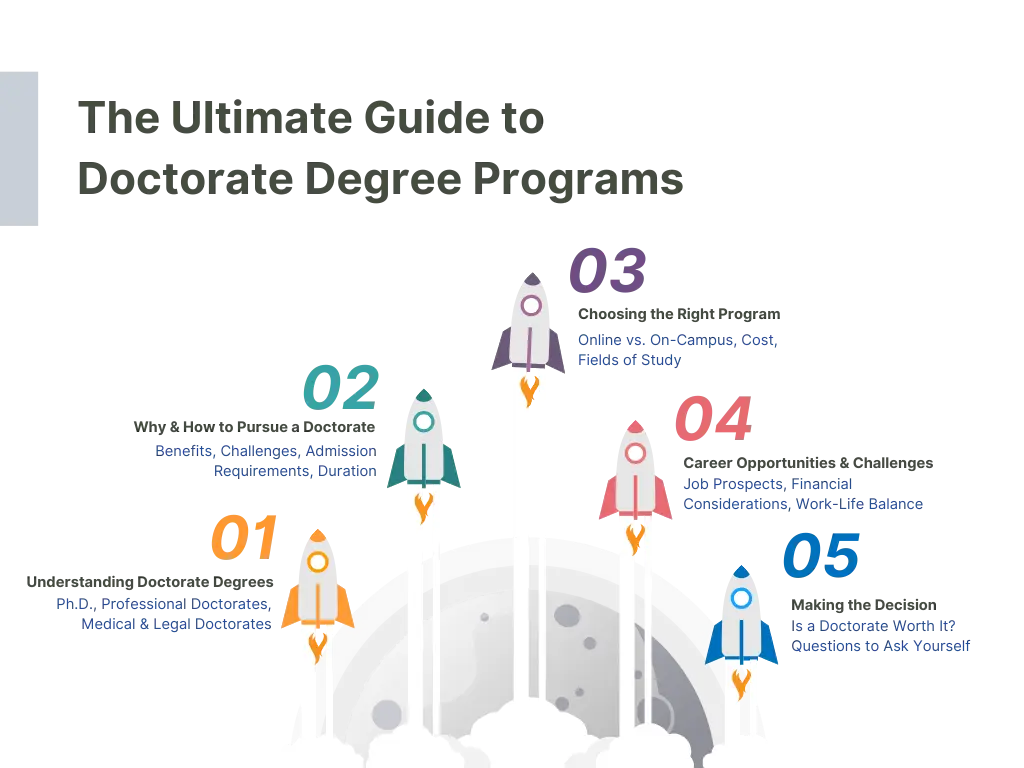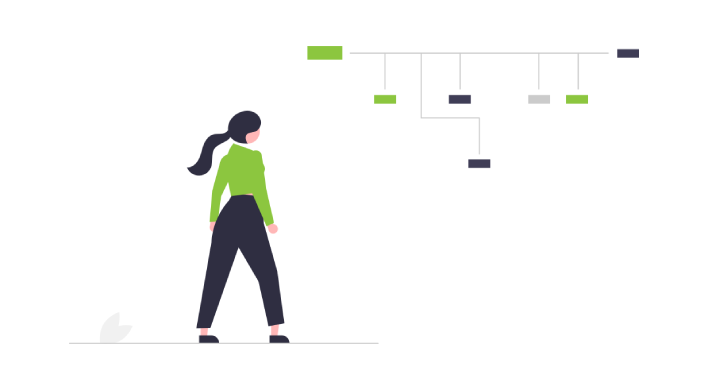The Ultimate Guide to Doctorate Degree Programs: Everything You Need to Know
Thinking about taking your education to the next level? A doctorate degree program could be the right move. This guide covers everything you need to know—from types and benefits to career opportunities—so you can decide if it’s the right path for you.

Doctorate Degree Programs
If you are reading this, chances are you are considering taking your academic journey to the highest level—a doctorate degree program. Whether you are passionate about research, aiming for a top-tier academic or executive position, or simply seeking personal growth, earning a doctorate can be a life-changing decision. But let us face it—it is a big commitment that requires your time, money, and energy. So, how do you decide if it is the right path for you?
In this detailed, human-written guide, we will walk you through everything you need to know about doctorate degree programs—types, benefits, challenges, career opportunities, and much more. Let us get into it.
What Is a Doctorate Degree?
A doctorate degree is the highest academic qualification one can achieve. It typically follows a master’s degree and requires several years of advanced study and original research. The most common types of doctorates include:
- Ph.D. (Doctor of Philosophy)
- Ed.D. (Doctor of Education)
- D.B.A. (Doctor of Business Administration)
- M.D. (Doctor of Medicine)
- J.D. (Juris Doctor for law)
While some doctorates are research-focused, others are professional doctorates geared toward practice and leadership in specific fields.
Types of Doctorate Degree Programs
Let us break down the most popular doctorate programs to help you understand what fits your goals:
1. Ph.D. (Doctor of Philosophy)
This is the most widely recognized doctorate and is primarily research-oriented. Ph.D. holders usually work in academia, research, or specialized consulting roles.
2. Professional Doctorates
These are designed for professionals aiming to advance in their careers:
- Ed.D. – for education leaders
- D.B.A. – for business executives
- D.N.P. – for nurse practitioners
- Psy.D. – for psychologists
3. Medical and Legal Doctoratese
- M.D. (Doctor of Medicine) – for physicians and surgeons
- J.D. (Juris Doctor) – for practicing law in the U.S.
Each program has its own entry requirements, timeline, and outcomes, so knowing the difference is crucial.
Why Pursue a Doctorate Degree?
People choose to pursue doctorates for various reasons:
Career Advancement
Many senior-level positions require or prefer doctorate-level education. Whether it’s becoming a university professor, lead researcher, or C-suite executive, a doctorate can open high-paying and prestigious roles.
Subject Mastery
Doctorate programs allow you to deep-dive into a specific topic, often one you’re truly passionate about. If you enjoy conducting research and solving complex problems, this is your playground.
Credibility and Prestige
Let us be honest: having “Dr.” before your name commands respect. It reflects years of hard work, intellectual dedication, and perseverance.
Contribution to Knowledge
Doctorate students often contribute to groundbreaking discoveries and innovations that have real-world impact.
How Long Does It Take to Earn a Doctorate?
The length of a doctorate program varies depending on the field and the type of degree:
- Ph.D. programs typically take 4–7 years
- Professional doctorates (e.g., D.B.A., Ed.D.) can take 3–5 years
- Medical and law degrees may take 3–4 years after undergraduate studies
However, many students pursue their doctorate part-time while working, which can extend the duration.
Doctorate Degree Admission Requirements
Lorem ipsum dolor sit amet, consectetur adipiscing elit. Ut elit tellus, luctus nec ullamcorper mattis, pulvinar dapibus leo.
Getting into a doctorate program is not easy. Here is what most institutions require:
- A master’s degree (some accept exceptional bachelor’s graduates)
- GPA of 3.0 or higher
- Standardized tests like the GRE or GMAT (varies by program)
- A statement of purpose or research proposal
- Letters of recommendation
- Relevant work or research experience
Each school and program may have additional requirements, especially for international students.
Online vs On-Campus Doctorate Programs
In today’s digital age, many reputable universities offer online doctorate programs. Let’s compare both formats:
Online Doctorate Programs
- Flexibility for working professionals
- Can be more affordable
- Great for professional doctorates
- May lacks access to in-person networking or lab resources
On-Campus Doctorate Programs
- Access to faculty mentorship, labs, and peer interaction
- Ideal for research-intensive fields
- May offer stipends or scholarships
- Requires relocation and a full-time commitment
Choose the format that best suits your lifestyle and career goals.
Cost of Doctorate Degree Programs
Let us talk numbers. A doctorate can be expensive:
- Tuition ranges from ₹25 lakhs to ₹85 lakhs or more, depending on the program and university.
- Add costs for books, research tools, travel, and living expenses
However, there are ways to offset the cost:
- Scholarships and grants
- Assistantships (teaching/research roles)
- Employer tuition reimbursement
- Federal student loans
Always compare programs for cost vs. value and consider your ROI (return on investment).
Doctorate Programs by Field of Study
Here are some popular fields with doctorate opportunities:
- Business (D.B.A., Ph.D. in Management)
- Education (Ed.D., Ph.D. in Education)
- Healthcare (D.N.P., Ph.D. in Public Health)
- Engineering (Ph.D. in Engineering Disciplines)
- Psychology (Psy.D., Ph.D. in Psychology)
- Computer Science and IT (Ph.D. in CS, AI, Data Science)
- Law and Policy (J.D., Ph.D. in Political Science)
Each field has unique career paths, research focus, and growth potential.
Challenges of Earning a Doctorate
Let us not sugarcoat it. Earning a doctorate is not a walk in the park. You will likely face:
- Long hours of reading, writing, and research
- Financial strain
- Stress and burnout
- Balancing life and academics
However, with the right support system and time management skills, you can overcome these hurdles.
Career Opportunities After a Doctorate
After earning a doctorate, a world of opportunities opens. Depending on your field, you could work as:
- University professor or academic researcher
- Chief Executive Officer or Director
- Clinical practitioner or specialist
- Government advisor or policy expert
- Consultant or industry researcher
- Author or speaker
Doctorate holders often enjoy higher salaries and more influence in their industries.
Is a Doctorate Degree Worth It?
Now for the million-dollar question—is it worth it?
If you are passionate about your field, committed to academic or career growth, and ready for the challenge, a doctorate can be incredibly rewarding. But if you are only doing it for the title or prestige, think twice. It is a serious investment of time, money, and energy.
Before jumping in, ask yourself:
- Do I have a clear goal?
- Can I handle the workload?
- Do I have financial support or funding?
- Will it truly boost my career?
Being honest with yourself here can save you years of regret—or lead to the best decision of your life.
Conclusion
Pursuing a doctorate degree program is no small feat—it is a journey of intellectual growth, career advancement, and personal transformation. Whether you choose a Ph.D., professional doctorate, or a specialized program, you are committing to something extraordinary.
Take the time to research, reflect, and plan your path carefully. With the right mindset, support system, and program, you will not only earn a degree—you will earn a new identity.
Ready to take the leap into a doctorate program? Start exploring your options today and begin the journey to becoming an expert in your field.
Reach out to us at www.saairatechnologies.com or give us a call at 7604897174 if you need assistance with the paper writing for your PhD project.
Contact Us
Guarantee of Service
PhD in Creativity
At Saaira Technologies, our mission is to provide a level of service unparalleled by any other organization. We take immense pride in our team of highly skilled and experienced pro-writers. We are excited to declare that, at Saaira Technologies, we never compromise when it comes to quality. Our commitment to excellence sets us apart in the industry.
Assurance and Privacy
At Saaira Technologies, we guarantee that your research and personal information will be treated with utmost confidentiality. We are committed to maintaining strict privacy and ensuring that your data is securely handled for internal purposes only. Your trust is of paramount importance to us, and we take every measure to safeguard your information.
24/7 Service Assistant
At Saaira Technologies, our team of experts is readily available round the clock on Facebook, WhatsApp, and Email, ensuring uninterrupted support and assistance. We operate 24 hours a day, 7 days a week, allowing clients to conveniently connect with us at any time. Your satisfaction is our priority, and we are committed to providing timely and reliable service.
Why choose us?
PhD help technical experts are very friendly and always ready to hear from you. Our experts are available at any stage of your PhD work.
The project you submit to us will be a hidden treasure and it will be confidential and maintained very secretly.
PhD help projects are always cost effective but we assure you that this will not affect the quality of your work.
PhD help developers are well experienced and professionals in their particular field. They are very eager and always on duty. They are readily available to help you in any situation and time. Our experts are available on the shop floor always ready to help you at any point of your PhD you are stuck.
Teams of Saaira Technologies
Business Development Executives


Data Scientist
Language Editing Division


Department of Journal Publications
What Sets Us Apart from The Competition?

